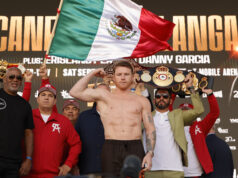
Rematches can be predictable remakes, or tiresome redundancies, or just unnecessary. But Manny Pacquiao-Timothy Bradley is none of the above. It had to happen.
In some ways, April 12 is more of a resumption than a rematch of Bradley’s rancorous split-decision over Pacquiao on June 9, 2012. Once the controversy subsided to a dull roar, only questions were left in the debris. If this were business as usual, there would be no answers and only the futility that surrounds the never-never land of a Pacquiao-Floyd Mayweather Jr. possibility.
But Pacquiao and Bradley will pick up where they left off in the same MGM Grand ring where their first chapter ended in what ranks as boxing’s noisiest controversy during the Twitter era.
Economics and a collection of dwindling options probably had more to do with the agreement than anything. Robert Guerrero’s name popped up as a Pacquiao possibility, but Bob Arum quickly dismissed that one.
If Arum hopes to re-affirm Pacquaio as a pay-per-view star after a reported audience of 475,000-to-500,000 bought his victory in China over Brandon Rios, he needed an attraction. Guerrero would have been a tune-up, another Rios. But a rematch with Bradley represents compelling drama with stage and story already in place.
It’s a dangerous fight, especially for Pacquiao. Most of the momentum appears to be with Bradley. In announcing the rematch, Arum called Bradley a different guy. In the public eye, he is. He underwent a remarkable transformation in the months since he was unfairly portrayed as a villain for the scorecards that gave him the debatable decision over Pacquiao.
He displayed courage in beating former Pacquiao sparring partner Ruslan Provodnikov in the 2013 Fight of the Year. Then, there was his poise and patience in outworking Juan Manuel Marquez, whose one-handed stoppage of Pacquiao in December 2012 put him face down and face-to-face with doubts the Filipino has yet to knock out. He looked good in scoring a decision over Rios in November. Only against Bradley, however, can he really prove he’s still the whirlwind we remember.
There’s plenty of uncertainty about whether he can. Indications are that Pacquaio will be about 7-4 favorite. At opening bell in 2012, he was favored 4 ½-to-1. If the speed and angles employed by Pacquaio in the first fight are still there, Bradley is in trouble. At least, that’s the theory.
But a couple of things happened in 2012 . Bradley suffered injuries to both ankles then. He showed up at the post-fight news conference in a wheel chair. In a sport that has seen it all, there’s no record of the winner ever addressing the media while confined to a wheel chair.
It’s fair to assume that Bradley’s ankles will hold up this time around. What happens then? Bradley without limits on his mobility has a much better chance in what figures to be another close fight.
Meanwhile, close fights have become a Bradley trademark, if not identity. He’s won each of his last three by narrow decision – Pacquiao and Marquez by split and Provodnikov by one point on two cards and three on the third. Debate the scoring all you want, but they add up to a resiliency. The unbeaten Bradley finds a way. He’s a survivor, which means he won’t waste a second chance.
Pacquiao’s motivation is no secret. He has a right to think he was robbed in 2012. He’s anxious to correct the record, to claim what should have been his all long. That’s an intangible, yet powerful. Still, it’s hard to get a good read on just who Pacquiao is these days. There’s been plenty of evidence he has lost some speed and power. To wit: The Pacquaio of old would have stopped Rios within five rounds.
There’s also talk about money problems and reports about tax issues. Who really knows? But know this: Pacquiao could have told Arum to put a hold on Bradley. He could have demanded Guerrero in a dull, yet safe step that might have kept alive talk about Mayweather, who started his Showtime contract with tune-up victory over Guerrero.
Pacquiao’s contract with Arum is set to expire at the end of 2014. Could Arum have said no? Pacquiao apparently listened to Arum. In terms of the bottom line, Bradley makes sense. In terms of Pacquaio’s career, there was no other choice. He had to pick Bradley if he wanted the public to take him seriously. But it’s very dangerous. So know this too:
Pacquiao has a history of agreeing to perilous rematches. He gave Marquez three extra chances when he really didn’t have to. The third chance proved devastating. But it was also fair and fearless, just two more elements in a series that has it all and begs for more.











